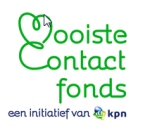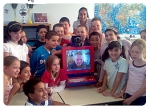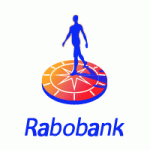Filed under: Best Practices in The Netherlands | Tags: Carbon Disclosure Project, Chemical Sector 2nd generation biofuels, Dow Jones Sustainability Index, DSM, Partnerships, White Biotechnology, World Food Program
DSM is one of the Chemical Sustainability Leaders. Joan Geerts of the Corporate Sustainability Department of DSM presents appealing examples of the development of DSM sustainable products such as carbon neutral polymers and white biotechnology. She also explains how the company is mobilising its employees.
DSM is a multinational Life Sciences and Materials Sciences company, employing worldwide 23,500 employees, generating annual revenues of over 9 billion Euros (1). The company has 5 Business Units: Nutrition (human and animal nutrition & health), Pharma (pharmaceutical products), Performance Materials (resins, engineering plastics), Polymer Intermediates (fibres, textiles and others) and Base Chemicals & Materials (agro, energy, melamine).
DSM products can be found in various business and consumer application areas varying from human food, to pharmaceuticals and fibers :

DSM application areas: Nutrition, Pharma, Performance Materials and Polymers (for fibres)
DSM is internationally known as leader in Sustainable Development : Dutch leader in the Carbon Disclosure Project Index 2009 and Sustainability Chemical Industry Leader in the Dow Jones Sustainability Index. How is Sustainability being managed at DSM?
Safety, health & Environmental issues have historically been well developed. Producer of materials, food and feed additives, antibiotics, etc., DSM has been focusing on managing health and environmental issues. DSM has dedicated departments for Corporate Sustainability and Corporate Operations & Responsible Care. The latter is responsible for all SHE issues (Safety, Health, and Environment) while line management is supported by sustainability and SHE managers at business group level. DSM was first appointed Sustainability Leader in the Dow Jones Sustainability Index in 2004. Fokko Wientjes was appointed as Director of DSM Corporate Sustainable Development in 2006 to streamline the Sustainability Policies and in this role strongly supported by DSM’s Managing Board Deputy Chairman Jan Zuidam. Jan Zuidam chaired the Sustainability Coordination Group, monitoring and aligning all actions and targets with respect to sustainability. In 2009 DSM appointed ‘Sustainability Champions’ in all of the business groups and the DSM Innovation Center. Wientjes and his team is working in close cooperation with these 12 Sustainability Champions to integrate our functional sustainability expertise with a business approach, focusing on business opportunities coming from sustainable development.
Joan Geerts holds an MSC in biopharmaceutical science. Having held different positions within DSM, a.o. in Intellectual Property for over 10 years, she started in the position of Manager Corporate Sustainable Development in 2008. Reporting to Fokko Wientjes, she supports internal and external sustainability activities, such as related to biodiversity, CSR report, engagement of employees and external stakeholder contacts and she is contact person for the Life Science Business Groups.
Joan Geerts, Manager Corporate Sustainable Development at DSM.
1. What are the Sustainability Objectives of DSM ?
Sustainability is an integral part of DSM’s Vision 2010 strategy and objectives. The DSM Vision 2010 strategy, created in 2005, sets out the companies Sustainability Goals:
1. Retain top position in SHE and Sustainability Rankings
2. Maintain global leadership position in ‘White biotechnology’ (*)
3. Continue reducing eco-footprint
4. Developing a more diverse, international workforce
5. Double energy reduction target from 1% to 2% per year.
[ * White Biotechnology is a sustainable development area for DSM. It refers to the biotechnological application of natural micro-organisms (like yeast, which is ‘levure’ in French and ‘gist’ in Dutch) to develop antibiotics and enzymes for, amongst others, food and drinks. In the production of white biotechnology, all materials and dissolving liquids are natural, so the waste products are biodegradable and environmental footprint is limited. DSM has extensive knowledge about this kind of micro-organisms (DSM Gist, until 1998 Gist Brocades Delft and DSM Nutritional Products, until 2001 Roche Fine Chemicals and Vitamins) ]
DSM is currently working on a new strategy and new targets, adds Joan Geerts. This new strategy will take sustainability a step further in the organization and will certainly address further reduction of greenhouse gas emissions, energy and water consumption. DSM also proceeds with calculating eco-footprints of all DSM products.
2. How does CSR contribute to Innovation ?
Sustainability and Corporate Responsibility are drivers for Innovation, confirms Joan Geerts. In fact, Innovation is the life current of DSM. No less than 350 new patents were filed in 2008 of 15,000 patents in total. The Innovations are driven by the companies’ own targets, societal trends and are inspired by and result of cooperation with academic world, industry and NGO partners. The vast majority of newly launched products are ‘ECO+’ with better ecological performance than mainstream competing products.
DSM is reducing its own footprint. Related to 2005, DSM has reduced 3,3 mln tons of CO2 equivalents GHG emissions. The intention is to achieve an additional 25% reduction in the period 2008-2020. The Business Unit DSM Agro achieved to reduce 2 millions tons of CO2 equivalents (N2O emissions) by applying new technology, which goes far beyond legally required emission reduction. DSM Agro obtained the Responsible Care Award 2008 of the Dutch Chemical Industry Association VNCI).
DSM has identified four key societal trends : Climate & Energy, Health & Wellness, Functionality & Performance, Emerging Economies. These trends are with a framework for the key innovation areas of DSM.
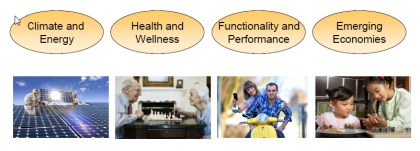
• The trend of ‘Climate and energy’ stimulates DSM developments in renewable sources, like biodegradable plastics, efforts to reduce eco-footprint and green house emissions and development of 2nd generation bio-fuels, generating energy from rest material of natural products, like stems and leaves because we do not want to compete with the food supply chain.

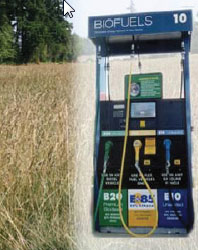
Biodegradable plastics and 2nd generation biofuels are two of the DSM innovation areas related to societal trend ‘Climate and Energy’.
Another example of a DSM innovation fighting climate change is EcoPaXXTM. This polymer is created from the oil generated by so called ‘Castor Beans’. EcoPaXXTM. Is carbon neutral: DSM Engineering has managed to create a product of which 70% is based on the oil of castor beans. This kind of beans is grown on very poor soil. The polymer has excellent mechanical qualities and only melts at 250 degrees Celsius. Castor bean plants absorb CO2 which makes the carbon footprint in the value chain close to, or even below zero.
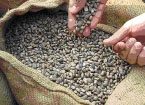
Castor beans, source of new biobased polymer, even appropriate for very infertile soils
It is DSM’s convinction that Governments, NGO’s and Industry should cooperate, e.g. to develop knowledge about carbon footprint reduction or combat global hunger. DSM is actively partnering with NGO’s. As of 2007, DSM is partner of the United Nations World Food Programme (WFP). DSM and WFP have jointly developed the product MixMeTM. The MixMeTM sachets contain food supplements that help provide the necessary and crucial micronutrients for a healthy development of children and for a long-term health of adults. In 2009 DSM reached 700,000 WFP beneficiaries with improved nutrition.
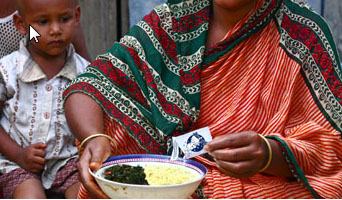
MixMeTM Food supplements developed by DSM and WFP distributed in India
Partnerships with other industry partners. DSM works closely together with many industry partners. An example is the partnership with AkzoNobel, of which we have described Best Practices earlier. Extensive knowledge about resin technology (DSM) and paints (AkzoNobel) are combined to develop new and sustainable painting solutions. AkzoNobel, one of DSM Sustainable Innovation Partners Mobilising employees. Last but not least, DSM is mobilising its own employees in various ways. May 2008, a Sustainability Week was organised in the Delft office to educate DSM employees about sustainability possibilities. The restaurant ran a ‘Food and Sustainability’ program, employee could calculate their own eco-footprint, cradle-to-cradle manufacturing was shown and they learned about the WFP partnership projects. In 2009, a group of young DSM potentials have rolled out a Sustainability Awareness Workshop reaching 1000 DSM employees. Like other companies (Veolia Environnement), Generation Y employees are strong drivers behind Sustainable Change internally.
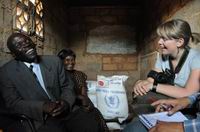
DSM employee-volunteers of the WFP-DSM partnership in action in Zambia
3 Does the economic crisis impact Sustainability Policies at DSM ?
Geerts believes that Ecology and Economy go hand in hand. Many companies have realised that a waste of materials is also waste of costs and valuable resources. The need to manage supply chains, energy/eco efficiency, use-what-you-need and recycle as much as possible is therefore cost effective ánd an environmentally responsible way of working. At DSM the economical crisis has lead to new business challenges as well as cash flow attention. However, the sustainability objectives have not been changed and we will proceed as planned.
4. What are trends and outlooks ?
Sustainability will rise as a Business Priority at DSM and in other companies, expects Joan Geerts. The new Sustainability Targets will take DSM a step further. DSM will continue to strive to a lower carbon footprint and work on sustainable innovations in close cooperation with its partners.
Sources : 1. http://www.dsm.com; 2. ‘DSM is everywhere’, SRI Presentation May 2009; 3. DSM Triple P report 2008. 4. http://www.peopleplanetprofit.be
Filed under: Best Practices in The Netherlands | Tags: Carbon Disclosure Project, KPN, Service Provider
Serving Dinner by the Top Managers of KPN have proven to be an excellent means of mobilisation of employees. Top Managers of the large Telecom Service Provider showed how to ‘Serve People’ in a most tangible way. KPNs CSR Officer Sven Drillenburg Lelijveld explains how KPN has defined its CR strategy and how it leads to new sustainable innovations..
KPN is the leading Dutch telecommunications and ICT service provider. Its predecessor, the national telecom and post company (PTT) was founded 150 years ago. In 1989, PTT was rebranded ‘KPN’ (Koninklijke PTT Nederland), privatised and listed at the Amsterdam Stock Exchange. The postal services continued as TNT Post. KPN currently employs 36,700 employees, mostly in Europe, and generates an annual turnover of 14,6 million euros (2008 numbers)(1) .
Sven Drillenburg Lelijveld, CSR Officer at KPN
Sven Drillenburg Lelijveld is KPN’s CSR Officer. The former Environmental Engineer with a sustainable development consultancy background started as CSR Officer at KPN in 2007. Drillenburg Lelijveld heads a team of three CSR professionals and is reporting into the KPN Corporate Communication Staff Department.
1. What are Corporate Responsibility Objectives of KPN ?
KPNs services contribute to societal development as they intrinsically ‘bring people together’. Furthermore, KPN has been leading a variety of socially engaged projects. These projects however were not that very visible nor were embedded in a CSR strategy.
In 2007 a new Corporate Social Responsibility Policy was defined. Within the KPN Board Baptiest Coopmans became topic pwmer. Coopmans describes the core objective of the companies CSR policy as ‘To add a warm heart to KPN’. Drillenburg Lelijveld adds that the central CSR themes are directly related to the KPN’s values and respond to societal trends :
1. People connected. KPN estimates that 5% of the Dutch people experience a lack of social contact. It is KPNs first CSR objective to offer knowledge, technology and employees’ time in order to fight loneliness, by using the newest communication technologies to enable contact. ‘The Finest Contact Foundation’ (het Mooiste Contact Fonds) is KPNs vehicle for this, addressing people who are relatively susceptible to social isolation (2). For instance, the project ClassContact provides ill children to make contact with class mates ; the ‘ComputerPlusBus’ with KPN volunteers, help senior people to become at ease with new media developments and the Resto VanHarte, 19 Dutch restaurants that offer easy to access eating facilities in underprivileged areas.
‘Finest Contact Foundation’, with one of the projects : ‘ClassContact’, allowing ill children to stay in contact with their class mates.
2. The New Way of Working. The Netherlands suffers from heavy traffic congestion during peak hours. In response, many people work from other home, during a part of the day or a few days per week. About 4 million people call themselves ‘flex workers’, according to Drillenburg Lelijveld. KPN wants to contribute to the ‘New Way of Working’ enabling flex working, keeping a good life/work balance, and valuing individual responsibility and entrepreneurship. For instance, KPN stimulates its employees to avoid rush hours and work from home during certain hours. The objective is to generate 5% less travel during rush hours in 2010. Telephone and video conferences are encouraged, instead of physical meetings that require travelling by car. Using call conferences instead of travelling has already saved 2,8 k metric tons C02 emission in 2007 (3).
3. Responsible Energy Use. The ICT industry is a high-energy consumer sector. KPN is responsible for 1% of the Dutch national electricity consumptions and its customers add another 1%. KPN aims to significantly reduce its energy consumption as well as its net green house gas emission. The objective is to become carbon neutral in 2020. The first steps were detailed analyses of KPNs green house gas emission by using official Greenhouse Gas Protocol. KPN is now testing new technologies and procedures, among them a new data center system based on natural ventilation ‘Kyoto Cooling’ that allows a energy reductions of up to 20%. Lease cars can only be chosen with a relatively low environmental impact, following the Dutch Energy A, B, or C label for cars. 50% of KPNs energy is renewable which will be increased up till 100% in 2011. All efforts so far has lead to energy savings of 40 GWh per year (3,7 million euros). The company was also noted as ‘leading telecom’ notification by the NGO ‘Carbon Disclosure Project’ in 2009.
Stakeholder dialogues refine CSR action plans. KPN has held various stakeholder dialogues in 2009 : 3 employee meetings, 2 customer meetings, 1 supplier and 1 meeting with external partners. The main conclusions were first of all the approval of the CSR themes as being well matching KPNs core values and business. Secondly, the stakeholders asked for more detailed operational objectives linked to the central teams. The CSR team is now working on this and will communicate in the next CSR Strategy plans and reports. A future step will be to split out the KPI’s down to the business units and individual bonus plans.
2. How does CSR contribute to Innovation ?
Corporate responsibility at KPN has already led to various innovations, according to KPNs CSR officer. Examples are KPNs flex working Solutions. KPN offers solutions that help customers to enable their employees to work in a pleasant and optimal way and reduce physical transport. Among the remote flex working ICT solutions are ADSL connections, Mobile UMTS (‘Dongel’) and Wifi services,
Consortium ‘Netherlands Reachable’. KPN is participating in the Taskforce ‘Nederland Bereikbaar‘together with Microsoft, the Dutch Railways (NS), Rabobank and the Dutch Association for Car Drivers (ANWB). The objective is to develop solutions and guidelines for ‘New Ways of Working’ for a good life/work balance and a reduction of the traffic congestion problems in The Netherlands.
New industry Standards. Together with other ICT experts, KPN is participating in The Green Grid. Among other activities of The Green Grid, it has developed a new coefficient for the energy efficiency of data centers.
Reinforcing a ‘Service Providing’ Mindset. All new technologies and partnerships have created new technological solutions and methodologies. Drillenburg Lelijveld adds that he notably recognized a changing mindset among the employees, which is very encouraging. Employees are increasingly committed to participate to do voluntary work (1700 inscriptions this year for the Finest Contact Foundation), notably the young generation. KPNs management proves to be supporting as well. The Top 50 executives have been serving dinner to less privileged people at Resto VanHarte last months. It has created a new flow of enthusiasm. Moreover, the top managers have set the example by serving dinner and making contact. It has reinforced the mindset of ‘serving people’, an essential competence being a service provider.

KPN Top managers serving dinner in less privileged city areas (Resto van Harte)
3. Does the economic Crisis impacts the CR Strategy ?
All industries are effected by the economical crisis. The CSR Strategy has however been set and will be irreversible. It will therefore be proceeded as foreseen. Simply because CSR has proven to strengthen business. ICT is a main driver for the upcoming sustainable society/economy.
4. What are outlooks for the sector ?
The trend to reduce energy and green house gas emissions will proceed. Fortunately, Drillenburg Lelijveld explains, the KPN board is a strong supporter of this. It is approving the necessary investments, such as for instance the slightly higher energy rates (1-2%) for renewable energy, in order to achieve the objective of 100% renewable energy in 2011.
KPN wants to maintain its frontrunner position in Corporate Responsibility The Netherlands.
Every step of social and environmental responsibility is important. Drillenburg Lelijveld states that it is easy to be sceptical as the climate change and social issues are enormous. It is likely that in 20 years time we recognize that the steps we set today are very small compared to the challenges were are facing. However, the direction is set and irreversible. It is important to be proud of every objective achieved. It keeps us going.
Sources : 1) www.kpn.com ; 2) www.mooistecontactfonds.nl ; 3) Mensen bij elkaar brengen, KPN Duurzaamheidsverslag 2008.




